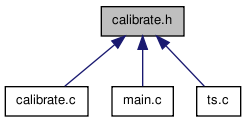calibrate.h File Reference
This graph shows which files directly or indirectly include this file:

Go to the source code of this file.
Data Structures | |
| struct | calibration |
Defines | |
| #define | CAL_XK 0 |
| #define | CAL_XX 1 |
| #define | CAL_XY 2 |
| #define | CAL_YK 3 |
| #define | CAL_YX 4 |
| #define | CAL_YY 5 |
| #define | CAL_S 6 |
| #define | NR_POINTS 5 |
Functions | |
| int | perform_calibration (calibration *cal) |
Define Documentation
| #define CAL_S 6 |
Definition at line 40 of file calibrate.h.
| #define CAL_XK 0 |
Definition at line 34 of file calibrate.h.
| #define CAL_XX 1 |
Definition at line 35 of file calibrate.h.
| #define CAL_XY 2 |
Definition at line 36 of file calibrate.h.
| #define CAL_YK 3 |
Definition at line 37 of file calibrate.h.
| #define CAL_YX 4 |
Definition at line 38 of file calibrate.h.
| #define CAL_YY 5 |
Definition at line 39 of file calibrate.h.
| #define NR_POINTS 5 |
Definition at line 42 of file calibrate.h.
Referenced by ts_handle_event(), and ts_init().
Function Documentation
| int perform_calibration | ( | calibration * | cal | ) |
Definition at line 40 of file calibrate.c.
References calibration::a, e, flag_debug, calibration::x, calibration::xfb, calibration::y, and calibration::yfb.
Referenced by ts_handle_event().
00040 { 00041 int j; 00042 float n, x, y, x2, y2, xy, z, zx, zy; 00043 float det, a, b, c, e, f, i; 00044 float scaling = 65536.0; 00045 00046 // Get sums for matrix 00047 n = x = y = x2 = y2 = xy = 0; 00048 for(j=0;j<5;j++) { 00049 n += 1.0; 00050 x += (float)cal->x[j]; 00051 y += (float)cal->y[j]; 00052 x2 += (float)(cal->x[j]*cal->x[j]); 00053 y2 += (float)(cal->y[j]*cal->y[j]); 00054 xy += (float)(cal->x[j]*cal->y[j]); 00055 } 00056 00057 // Get determinant of matrix -- check if determinant is too small 00058 det = n*(x2*y2 - xy*xy) + x*(xy*y - x*y2) + y*(x*xy - y*x2); 00059 if(det < 0.1 && det > -0.1) { 00060 fprintf(stderr, "ts_calibrate: determinant is too small -- %f\n",det); 00061 return 0; 00062 } 00063 00064 // Get elements of inverse matrix 00065 a = (x2*y2 - xy*xy)/det; 00066 b = (xy*y - x*y2)/det; 00067 c = (x*xy - y*x2)/det; 00068 e = (n*y2 - y*y)/det; 00069 f = (x*y - n*xy)/det; 00070 i = (n*x2 - x*x)/det; 00071 00072 // Get sums for x calibration 00073 z = zx = zy = 0; 00074 for(j=0;j<5;j++) { 00075 z += (float)cal->xfb[j]; 00076 zx += (float)(cal->xfb[j]*cal->x[j]); 00077 zy += (float)(cal->xfb[j]*cal->y[j]); 00078 } 00079 00080 // Now multiply out to get the calibration for framebuffer x coord 00081 cal->a[0] = (int)((a*z + b*zx + c*zy)*(scaling)); 00082 cal->a[1] = (int)((b*z + e*zx + f*zy)*(scaling)); 00083 cal->a[2] = (int)((c*z + f*zx + i*zy)*(scaling)); 00084 00085 if (flag_debug) 00086 fprintf(stderr, "%f %f %f\n",(a*z + b*zx + c*zy), 00087 (b*z + e*zx + f*zy), 00088 (c*z + f*zx + i*zy)); 00089 00090 // Get sums for y calibration 00091 z = zx = zy = 0; 00092 for(j=0;j<5;j++) { 00093 z += (float)cal->yfb[j]; 00094 zx += (float)(cal->yfb[j]*cal->x[j]); 00095 zy += (float)(cal->yfb[j]*cal->y[j]); 00096 } 00097 00098 // Now multiply out to get the calibration for framebuffer y coord 00099 cal->a[3] = (int)((a*z + b*zx + c*zy)*(scaling)); 00100 cal->a[4] = (int)((b*z + e*zx + f*zy)*(scaling)); 00101 cal->a[5] = (int)((c*z + f*zx + i*zy)*(scaling)); 00102 00103 if (flag_debug) 00104 fprintf(stderr, "%f %f %f\n",(a*z + b*zx + c*zy), 00105 (b*z + e*zx + f*zy), 00106 (c*z + f*zx + i*zy)); 00107 00108 // If we got here, we're OK, so assign scaling to a[6] and return 00109 cal->a[6] = (int)scaling; 00110 return 1; 00111 /* 00112 // This code was here originally to just insert default values 00113 for(j=0;j<7;j++) { 00114 c->a[j]=0; 00115 } 00116 c->a[1] = c->a[5] = c->a[6] = 1; 00117 return 1; 00118 */ 00119 00120 }
Here is the caller graph for this function:

 1.6.2-20100208
1.6.2-20100208